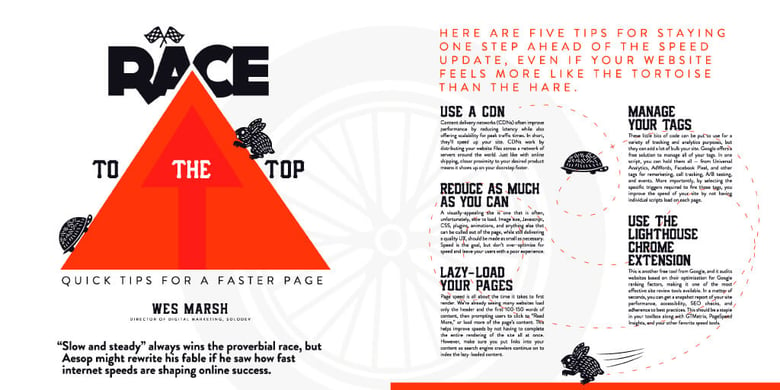
“Slow and steady” always wins the proverbial race, but Aesop might rewrite his fable if he saw how fast internet speeds are shaping online success.
For the fourth consecutive year, mobile devices remain the go-to platform for users to visit their websites of choice. The average time for mobile websites to fully load is 22 seconds, according to Hubspot data. However, the average web visitor will start to leave after only 3. It’s time to find a way to slim down everything on your website: Google’s Speed Update is coming.
Google announced in January that page speed would weigh more heavily into mobile search ranking. As the Google Webmaster Central Blog points out, the updates always start by affecting the slowest websites first, but don’t get comfortable. Just because it affects a small percentage of queries right now doesn’t give you an excuse to wait. Google has already offered a six-month heads-up to prepare for this update. It’s fair to assume that the Speed Update will continue to be a transformative part of the core algorithm.
Here are five tips for staying one step ahead of the Speed Update, even if your website feels more like the tortoise than the hare.
Use a CDN
Content delivery networks (CDNs) often improve performance by reducing latency while also offering scalability for peak traffic times. In short, they’ll speed up your site. CDNs work by distributing your website files across a network of servers around the world. Just like with online shipping, closer proximity to your desired product means it shows up on your doorstep faster.
Reduce as Much as You Can
A visually-appealing site is one that is often, unfortunately, slow to load. Image size, Javascript, CSS, plugins, animations, and anything else that can be culled out of the page, while still delivering a quality UX, should be made as small as necessary. Speed is the goal, but don’t over-optimize for speed and leave your users with a poor experience.
Lazy-Load Your Pages
Page speed is all about the time it takes to first render. We’re already seeing many websites load only the header and the first 100-150 words of content, then prompting users to click to “Read More,” or load more of the page’s content. This helps improve speeds by not having to complete the entire rendering of the site at once. However, make sure you put links into your content so search engine crawlers continue on to index the lazy-loaded content.
Manage Your Tags
These little bits of code can be put to use for a variety of tracking and analytics purposes, but they can add a lot of bulk your site. Google offers a free solution to manage all of your tags. In one script, you can hold them all — from Universal Analytics, AdWords, Facebook Pixel, and other tags for remarketing, call tracking, A/B testing, and events. More importantly, by selecting the specific triggers required to fire those tags, you improve the speed of your site by not having individual scripts load on each page.
Use the Lighthouse Chrome Extension
This is another free tool from Google, and it audits websites based on their optimization for Google ranking factors, making it one of the most effective site review tools available. In a matter of seconds, you can get a snapshot report of your site performance, accessibility, SEO checks, and adherence to best practices. This should be a staple in your toolbox along with GTMetrix, PageSpeed Insights, and your other favorite speed tools.
Recap
Even if your page seems speedy, try out each of these tips for a faster site. Though providing a great experience for your visitors should be incentive enough, page speed isn’t simply a UX factor now that Google is shifting to meet user demand. The extra work you put into greasing the wheels could soon be the difference between you and your competitor at the top of the SERPs — don’t get left in the dust.

